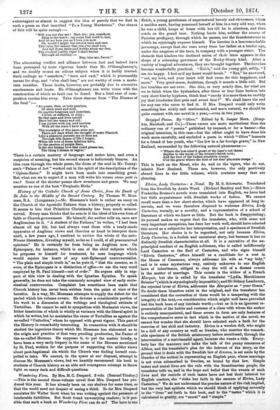Wandering Fires. By Mrs. M. C. Despard. 8 vols. (Samuel
Tinsley.) —This is the second three-volume novel that Mrs. Despard has pro- dneed this year. It has already been on our shelves for some time, so that the world need not despair of seeing a third. So far Mrs. Despard emulates Sir Walter Scott when he was writing against the pressure of intolerable liabilities. But Scott found nnwearying readers ; is it pos- sible that such a book as Wandering Fires can do so? The hero is one
Erich, a young gentleman of supernatural beauty and cleverness, whom a maiden aunt, having possessed herself of him in a very odd way, when he was a child, keeps at home with her till he is nineteen, and then sends on the grand tour. Nothing hurts him, neither the course of Parisian profligacy, through which he passes, nor the thunderstorms to which he rejoicingly exposes himself. The heroine is a less remarkable personage, except that she runs away from her father at a tender age, under the auspices of the hero, in company with a younger sister. The obstacle that hinders the destined union of th3ir fates appears in the shape of a scheming governess of the Becky-Sharp kind. After a variety of tragical adventures, they are brought together. The hero has become wonderfully practical. "Erich," said the young girl, softly, "I am too happy. I feel as if my heart would break." "Eat," he answered, "eat, my love, and your heart will find room for this happiness, and more." Very good-sense, doubtless, though it sounds a little odd. But her troubles are not over. She dies, or very nearly dies, for what are we to think when the bystanders, after three or four lines broken into very short bits by hyphens, think that "surely it is more than an earthly joy that irradiates that pale and sweet face ?" We shall leave the end for any one who cares to Slid it. If Mrs. Despard would only write something less sickly and sentimental, and more natural, we should be quite content with one novel in a year,—even in two years.






































 Previous page
Previous page